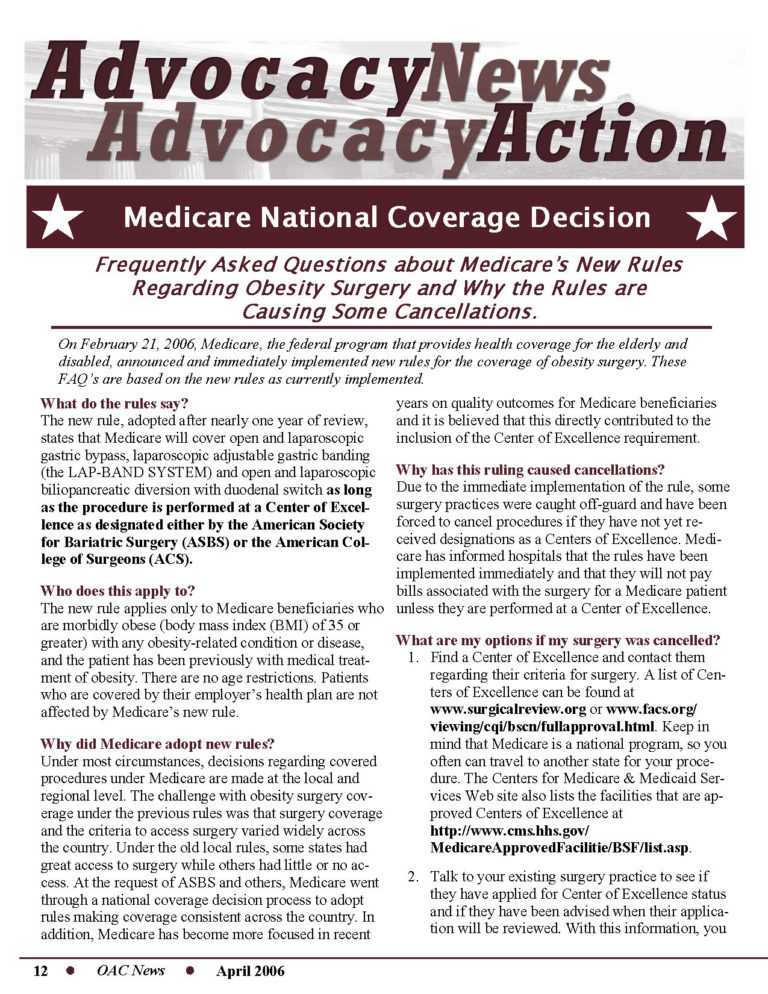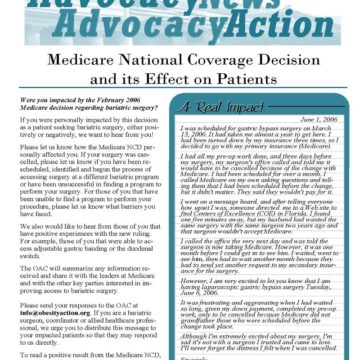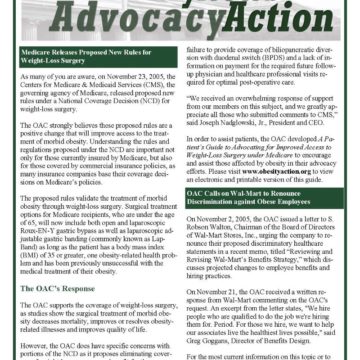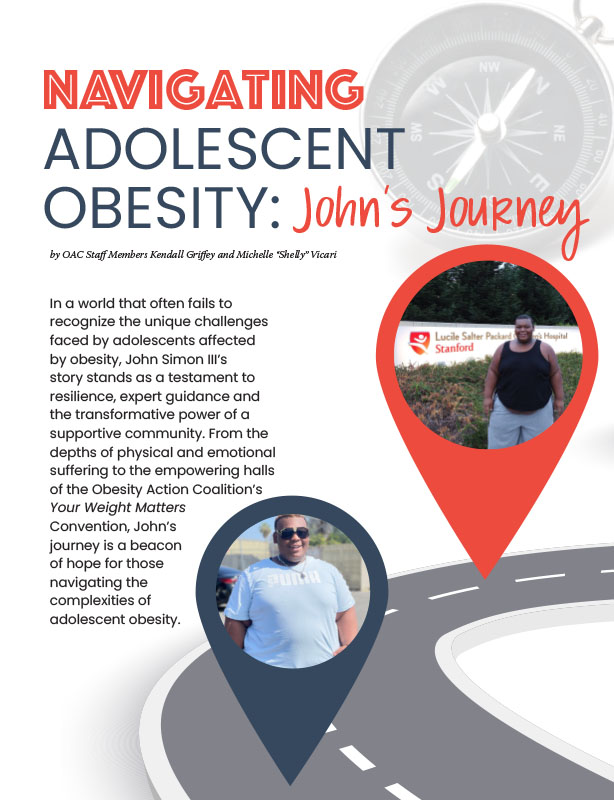Frequently asked questions about Medicare’s new rules regarding obesity surgery and why the rules are causing some cancellations.


Spring 2006
On February 21, 2006, Medicare, the federal program that provides health coverage for the elderly and disabled, announced and immediately implemented new rules for the coverage of obesity surgery. The FAQ’s are based on the new rules as currently implemented.
What do the rules say?
The new rule, adopted after nearly one year of review, states that Medicare will cover open and laparoscopic gastric bypass, laparoscopic adjustable gastric banding (the LAP-BAND SYSTEM) and open and laparoscopic biliopancreatic diversion with duodenal switch as long as the procedure is performed at a Center of Excellence as designated either by the American Society for Bariatric Surgery (ASBS) or the American College of Surgeons (ACS).
Why did Medicare adopt new rules?
Under most circumstances, decisions regarding covered procedures under Medicare are made at the local and regional level. The challenge with obesity surgery coverage under the previous rules was that surgery coverage and the criteria to access surgery varied widely across the country. Under the old local rules, some states had great access to surgery while others had little or no access. At the request of ASBS and others, Medicare went through a national coverage decision process to adopt rules making coverage consistent across the country. In addition, Medicare has become more focused in recent years on quality outcomes for Medicare beneficiaries and it is believed that this directly contributed to the inclusion of the Center of Excellence requirement.
Who does this apply to?
The new rule applies only to Medicare beneficiaries who are affected with severe obesity (body mass index (BMI) of 35 or greater) with any obesity-related condition or disease and the patient has been previously unsuccessful with medical treatment of obesity. There are no age restrictions. Patients who are covered by their employer’s health plan are not affected by Medicare’s new rule.
Why has this ruling caused cancellations?
Due to the immediate implementation of the rule, some surgery practices were caught off-guard and have been forced to cancel procedures if they have not yet received designations as a Centers of Excellence. Medicare has informed hospitals that the rules have been implemented immediately and that they will not pay bills associated with the surgery for a Medicare patient unless they are performed at a Center of Excellence.
What are my options if my surgery has been cancelled?
1. Find a Center of Excellence and contact them regarding their criteria for surgery. Keep in mind that Medicare is a national program, so you often can travel to another state for your procedure. The Centers for Medicare & Medicaid Services Web site also lists the facilities that are approved Centers of Excellence at www.cms.hhs.gov/MedicareApprovedFacilitie/BSF/list.asp.
2. Talk to your existing surgery practice to see if they have applied for Center of Excellence status and if they have been advised when their application will be reviewed. With this information, you can make the decision whether to wait for your existing practice to receive the appropriate Center of Excellence status or choose a new practice which is already designated as a Center of Excellence.
What is required for a hospital to be designated as a Center of Excellence?
To become certified as an ASBS Center of Excellence, the hospital or institution must:
- Perform at least 125 bariatric surgeries per year collectively.
- The surgeon must have performed at least 125 bariatric surgeries by him or herself over a lifetime and perform at least 50 per year.
- The center must also report long-term patient outcomes and have an on-site inspection to verify all data.
- The center must have a dedicated multi-disciplinary bariatric team that includes surgeons, nurses, medical consultants, nutritionists, psychologists and exercise physiologists.
Requirements from the ACS are similar. For information on ACS requirements, visit www.facs.org.
Why is Medicare requiring Centers of Excellence status?
For a variety of reasons including:
- A wide variety of data suggests that surgeon experience is an important factor in better outcomes and reducing deaths and complications.
- Data also suggests that comprehensive programs, those with pre-op and post-op care, also report better outcomes.
- The requirement of data collection (outcomes, mortality and complications) under the Centers of Excellence programs provides important information for future rulings.
Medicare’s acting chief medical officer, Barry Straube, MD, said, “ CMS’ expanded decision draws upon the specific criteria that facilities must meet in order to obtain certification from either the American College of Surgeons or the American Society for Bariatric Surgery. Utilizing these groups’ expertise will ensure that beneficiaries will receive optimal care in a manner that provides the greatest likelihood of successful outcomes from this important procedure.”
How many Centers of Excellence are there?
As of March 21, 2006, there are 123 in 33 states.
There isn’t a Center of Excellence near my home. What can I do?
You have a couple of options. The first is to be patient. The ASBS and ACS continually certify new surgeons/hospitals.
Your second option is to contact the closest Center of Excellence to you. Medicare is a national program so beneficiaries often have the option to travel out of state to receive medical care.
I thought my hospital was a Bariatric Surgery Center of Excellence. Why isn’t it on the list?
Many commercial insurance companies and others use the Center of Excellence designation. In addition, some centers may have indicated they have applied for Center of Excellence status, but have not received a final review. Medicare specifically required that surgeons/hospitals be designated as a Center of Excellence by either the ASBS or ACS.
Do all Centers of Excellence accept Medicare?
No. You will need to contact the center directly to see if they accept Medicare and/or have any other financial requirements.
I’m a Medicare beneficiary with surgery scheduled soon, but haven’t heard from my surgeon. What should I do?
Contact your surgeon’s office to see if they are a Center of Excellence. Remember, if you have the surgery and they are not a Center of Excellence, you may be personally liable for the surgery and hospital fees.
Does this ruling affect my private insurance or my state Medicaid coverage?
No. The rules apply only to Medicare beneficiaries. It is hoped that the rules will encourage commercial insurers and Medicaid programs to expand their coverage in the future.
I heard media reports a few months ago about Medicare eliminating coverage of obesity surgery for those 65 years of age and older. Will the rules allow me to have surgery?
Yes. There are no age restrictions in the new rules.
There is a great deal of confusion on this issue. As part of the process of adopting new rules, Medicare originally proposed limiting surgery to those under the age of 65. This proposed rule was removed from the final decision when the obesity surgery community provided additional data on the safety and effectiveness of obesity surgery in older Americans.
Do all Centers of Excellence accept patients 65 years of age or older?
No. Individual surgeons/hospitals set their own age requirements. You will need to contact the center directly to determine their patient requirements.
My question wasn’t answered above. Who can I talk to?
Feel free to call the OAC National Office at (800) 717-3117 or e-mail us at info@obesityaction.org. If we don’t know the answer to your question, we’ll try to find out for you or refer you to the appropriate agency/organization.
by Kendall Griffey, OAC Communications Manager Spring 2024 We have officially kicked off Your Weight Matters Regional…
Read Articleby OAC Staff Members Kendall Griffey and Michelle “Shelly” Vicari Winter 2024 In a world that often…
Read Articleby Rachel Engelhart, RD; Kelly Donahue, PhD; and Renu Mansukhani, MD Summer 2023 Welcome to the first…
Read Article









